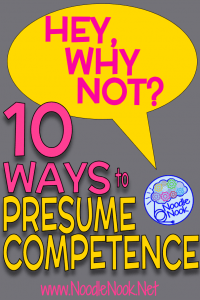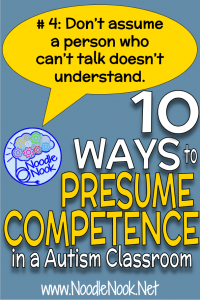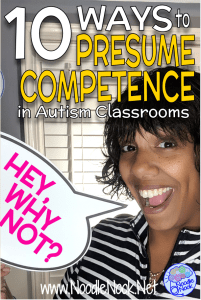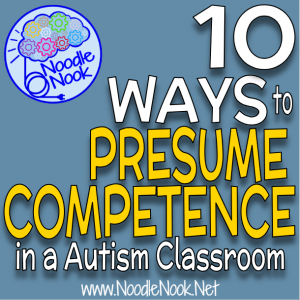10 Easy Ways to Presume Competence in Students with Disabilities like Autism.
Presuming Competence: What is means, why you should, what it looks like, and why it is important.
There is nothing I find more infuriating than when someone dismisses me as though I don’t or can’t understand; when someone does not presume competence with me. Have you been there? Have you ever had someone size you up and then talk to you like you couldn’t possibly understand?
It happened to me at a tech store… I may not be Steve Jobs, but I do run my own website. So, don’t talk to me like I couldn’t possibly wrap my brain around technology.
Okay, me off on a tangent. The truth is we ALL want to be treated with respect and dignity. We ALL want people to presume competence about us, so why would you do differently for students with disabilities?
Okay… let’s start with a lingo check.
What Does It Means to Presume Competence?
In the simplest terms…
To presume competence means you should assume a person with a disability, like Autism, has the capacity to think, to learn, and to understand— even if you can’t see any tangible evidence to prove it.
-Ayo Jones via www.NoodleNook.Net
When you presume competence, you assume a student with a disability does and can understand when they are being spoken of and to. And IF we do not presume competence and treat a student or child like they cannot learn and they cannot understand… and turn out to be wrong, our presumption would do them irreparable harm. So, even if a student cannot talk, does not respond to your questions, or doesn’t look you in the face… even if they cannot acknowledge you at all you, as an educator, you will ALWAYS presume they are competent. They are in there and can hear you, understand you, and can learn.
Why You Need to Presume Competence
Least dangerous assumption and presumed competence go hand in hand. You can read more about the least dangerous assumption here. You should always make the assumption that a student can understand and can learn… because if you are wrong and you’ve spend tons of time talking with respect and continuing to teach a student with the expectation that they can understand and learn there is no harm done if you are wrong.
This lingo of Least Dangerous Assumption was first coined by Anne Donnellan in the ‘80’s.
Failing to teach a student and assuming they can’t learn does irreparable harm. I love the videos on the Least Dangerous Assumption post. I use them every year as part of training new staff. Everyone who works with students who have disabilities should come to work with Presume Competence Least Dangerous Assumption in the forefront of their mind.
What Presumed Competence Looks Like in the Classroom
I posted a video of 10 ways to presume competence in students with disabilities including Autism on YouTube. You can watch that below.
These easy and actionable strategies are a perfect way to review presumed competence with support staff. Review this before the school year starts, before an ESY session, or during the school year as teachers and aides start to burn out.
Take a few minutes to watch this all the way through and learn more. There are several great examples that relate directly to teachers and aides in Autism Units, self-contained classrooms, and those supporting students with low incidence disabilities.
Why Presumed Competence is Important
Every student sitting in a K-12 classroom deserves the opportunity to learn, to have a teacher that believes in them, and to be treated with dignity.
What if it was you? What if it was your child? How you want them or you to be treated?
And your expectations matter. One of the most powerful indicators of later success for a student is a good teacher… and good teachers make the least dangerous assumption, presume competence, and have high expectations for their students.
In the lifetime of a person with a disability, the time spent with you is a blip. And as technology, therapy, and treatments advance, what a person has the capacity to do in the future exceeds what you can imagine in the present moment… so educate, educate, educate. A breakthrough could be in a child’s future. And you want that moment to be because of all you’ve done, not in spite of what you didn’t do.
Rock that Presumed Competence
If you are empowered or want to share some empowerment with your team, rock out on a Presumed Competence tee shirt. Read more from the original Anne Donnellan, specifically her book “Progress Without Punishment: Effective Approaches for Learners with Behavior Problems”. Take the time to learn more about teaching students with Autism by reading “1001 Great Ideas for Teaching and Raising Children with Autism or Asperger’s” with the forward by Temple Grandin.

Stay Strong and Teach On!
HEY! Get social with us! Follow us on Pinterest, Instagram, Facebook, Twitter, YouTube or iTunes!
AND… Be sure to subscribe to the Noodle Nook monthly newsletter full of tips, tricks, resources, and FREE tools for teachers in Special Ed and Autism Units. Listen, read and watch to learn how to be more successful in your classroom with Noodle Nook.
Article Citation: [cite]







I thought your video was pretty on point! My only feedback is that I wish you used people first language and rather than saying “intellectual disabilities,” refer to your students as students with “intellectual differences.” Thank you!
Pingback: Ask “Why” Instead of “How” to Understand Autistic People – PosAutivity
Comments are closed.